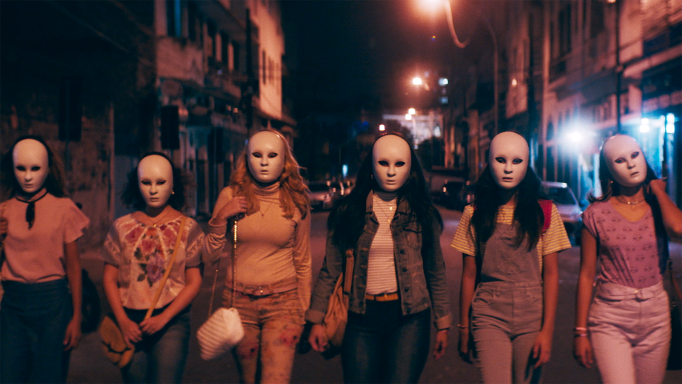![]() Brazilian director Anita Rocha da Silveira’s Medusa melds caustic social satire, horror tropes, and candy-colored pop-song interludes, and unfolds in a hermeneutic world where we never see a car or a bustling cityscape. The action is confined to interiors (well, maybe and a back yard or two) and a pitch-black jungle that will take on a fateful significance. In a prolonged scene early on, a group of young women in creepy white plastic masks chase another woman down the street. We sense her panic, and it turns out to be justified as they savagely beat her. “Slut!” “Whore!” they scream. They only stop the attack when she repents, swearing she’s a good Christian and promising to change her wanton ways, all of which they record and post online. Like the shrewish girl gang in The Crucible, they have turned on and punished a sinner in their midst.
Brazilian director Anita Rocha da Silveira’s Medusa melds caustic social satire, horror tropes, and candy-colored pop-song interludes, and unfolds in a hermeneutic world where we never see a car or a bustling cityscape. The action is confined to interiors (well, maybe and a back yard or two) and a pitch-black jungle that will take on a fateful significance. In a prolonged scene early on, a group of young women in creepy white plastic masks chase another woman down the street. We sense her panic, and it turns out to be justified as they savagely beat her. “Slut!” “Whore!” they scream. They only stop the attack when she repents, swearing she’s a good Christian and promising to change her wanton ways, all of which they record and post online. Like the shrewish girl gang in The Crucible, they have turned on and punished a sinner in their midst.
A wary young biracial nurse, Mari (Mariana Oliveira), is part of the posse, looking to establish her place. These young women form part of an evangelical cult that meets to hear paranoid harangues from a charismatic preacher and to savor marriage-minded courting from a masculine paramilitary group. They perform choreographed sexy pop songs extolling chastity, dressed in baby-doll pink and making undulating moves with David Lynch-meets-American Idol flair. At every opportunity, Mari makes a point of sucking up to the gang’s blonde, blue-eyed White Mean Girl leader and social media influencer, Michele (Lara Tremouroux), vying with others to be the most pious of the lot.
Director Rocha da Silveira (Kill Me Please) raises Medusa’s fear factor in three intersecting plotlines. Mari is indoctrinating a vulnerable tween into the group. A violent showdown where the posse’s potential victim handily fights back ends in Mari’s humiliation (and pain—unlike a lot of movie fights, this one lets you feel the agony, shock, and disbelief as the tables are turned). And in the creepiest episode of all, Mari signs on as a nurse at an eerie hospital for coma patients to track down a woman the group disfigured, all to shame her again. Disillusions (and temptation in the form of a hunky male nurse) begin to mount for Mari.
It’s easy to get lost in the movie’s high-contrast, vibrating, neon-lit visuals and to groove on its paroxysms of hysteria. An artful soundtrack combining proggy electro with dark 1980s hits ups the hip factor, but sharp takes on society’s hypocrisies give the film real bite. In this ostensibly spiritual community, looks matter big time (as does, it is implied, skin color). Christian charity goes out the window when the women eagerly punish others, and dewy narratives of purity play into authoritarian agendas. Rocha da Silveira makes a strong statement and provides a character to match. Mari’s aspirations, fears, and possible awakening keep us involved in the dark story line, and Oliveira’s grounded acting makes Mari relatable. Candy-colored and stylized and often surreal as it is, the provocative Medusa contains a lot that feels very relevant right now.







Leave A Comment